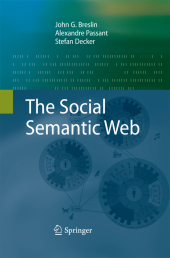 Neuerscheinungen 2014Stand: 2020-02-01 |
Schnellsuche
ISBN/Stichwort/Autor
|
Herderstraße 10
10625 Berlin
Tel.: 030 315 714 16
Fax 030 315 714 14
info@buchspektrum.de |

John G Breslin, Stefan Decker, Alexandre Passant
(Beteiligte)
The Social Semantic Web
2009. 2014. ix, 300 S. 1 Tabellen. 235 mm
Verlag/Jahr: SPRINGER, BERLIN; SPRINGER BERLIN HEIDELBERG 2014
ISBN: 3-642-42432-5 (3642424325)
Neue ISBN: 978-3-642-42432-8 (9783642424328)
Preis und Lieferzeit: Bitte klicken
This book offers a brief overview of the Social Web and Semantic Web before it describes popular social media and social networking applications, including their strengths and limitations. It also describes useful applications of Semantic Web technology.
The Social Web (including services such as MySpace, Flickr, last.fm, and WordPress) has captured the attention of millions of users as well as billions of dollars in investment and acquisition. Social websites, evolving around the connections between people and their objects of interest, are encountering boundaries in the areas of information integration, dissemination, reuse, portability, searchability, automation and demanding tasks like querying. The Semantic Web is an ideal platform for interlinking and performing operations on diverse person- and object-related data available from the Social Web, and has produced a variety of approaches to overcome the boundaries being experienced in Social Web application areas.
After a short overview of both the Social Web and the Semantic Web, Breslin et al. describe some popular social media and social networking applications, list their strengths and limitations, and describe some applications of Semantic Web technology to address their current shortcomings by enhancing them with semantics. Across these social websites, they demonstrate a twofold approach for interconnecting the islands that are social websites with semantic technologies, and for powering semantic applications with rich community-created content. They conclude with observations on how the application of Semantic Web technologies to the Social Web is leading towards the "Social Semantic Web" (sometimes also called "Web 3.0"), forming a network of interlinked and semantically-rich content and knowledge.
The book is intended for computer science professionals, researchers, and graduates interested in understanding the technologies and research issues involved in applying Semantic Web technologies to social software. Practitioners and developers interested in applications such as blogs, social networks or wikis will also learn about methods for increasing the levels of automation in these forms of Web communication.
to the book.- Motivation for applying Semantic Web technologies to the Social Web.- to the Social Web (Web 2.0, social media, social software).- Adding semantics to the Web.- Discussions.- Knowledge and information sharing.- Multimedia sharing.- Social tagging.- Social sharing of software.- Social networks.- Interlinking online communities.- Social Web applications in enterprise.- Towards the Social Semantic Web.


